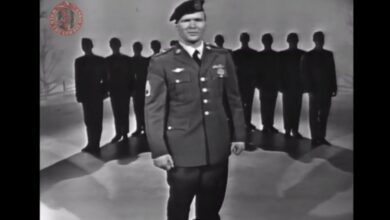Priscilla Claims Elvis Channeled His Deep Feelings Into This Song
Elvis Presley’s tale embodies the spirit of creativity and determination that defines many exceptional artists. Born on January 8, 1935, in Tupelo, Mississippi, he was the only surviving child of Vernon and Gladys Presley. The family faced significant economic challenges, and the difficulties of the Great Depression greatly influenced their lives. When Elvis was a teenager, the family relocated to Memphis, Tennessee, which would serve as a pivotal location in his musical journey. The rich musical landscape of Memphis surrounded him with a variety of genres, fostering a deep respect for different musical traditions that would shape his artistic growth.
Elvis’s musical journey began on his 11th birthday when he received a guitar as a gift. He practiced with dedication, showcasing a natural talent that soon emerged. Although naturally shy, he found comfort and purpose in music, which became a powerful form of self-expression. His passion for music was fueled by the sounds of Mississippi and the vibrant atmosphere of Memphis, where he frequently attended church services. The gospel music he experienced in those settings left a lasting impression, cultivating his appreciation for soulful melodies and rich harmonies.
In 1954, Elvis, with his distinct vocal style merging rhythm and blues with country, recorded “That’s All Right” at Sun Studio. The immediate and enthusiastic response marked the emergence of rock and roll as a dominant genre in American music. He became a symbol of youthful rebellion, capturing attention not just for his musical talent but also for his flamboyant performance style and signature dance moves. His striking looks, talent, and captivating stage presence propelled him to superstardom, leading to chart-topping hits like “Blue Suede Shoes” and “Love Me Tender.”
As the 1950s unfolded, Elvis became an icon of rock and roll. His records shattered sales records, and his electrifying performances transformed the music industry. However, his rapid rise was met with controversy. Critics and conservative figures often condemned his style and performances, deeming them inappropriate. Nevertheless, these challenges only seemed to amplify his allure, particularly among the youth who were entranced by his charisma and the liberating message of his music.
In addition to his flourishing music career, Elvis dabbled in acting, making his mark on Hollywood with a series of films where he typically starred in lead roles. Movies like “Jailhouse Rock” and “Viva Las Vegas” gained immense popularity, although many critics claimed that the quality of his music suffered as a result of his commercial endeavors. By the mid-1960s, while he remained a household name, his musical innovation appeared to take a backseat to his film career. This period was complex for Elvis; though still commercially successful, he contributed less to the music scene.
The groundbreaking “68 Comeback Special” revitalized Elvis’s career, reaffirming his position as a musical powerhouse. This televised performance showcased his incredible talent, reigniting the passion and energy that initially catapulted him to fame. Featuring a mix of revisited classics and new material, Elvis once again charmed audiences, using the platform to convey his feelings and address pressing social issues of the time. His powerful rendition of “If I Can Dream” resonated deeply with viewers, encapsulating the collective desire for a better America amidst social turmoil.
Elvis’s return to music in this period was marked by greater emotional depth, reflecting the turbulent socio-political climate of the late 1960s. “If I Can Dream” transcended mere entertainment, delivering a profound message of hope, unity, and the longing for change. The song resonated with those yearning for societal healing, and his heartfelt performance became an anthem for those advocating for progress and social justice.
After the comeback special, Elvis continued to perform with renewed zeal. His vibrant stage presence during live shows in Las Vegas and on tours highlighted his passion for music and his connection with fans. His ability to infuse greater emotional intensity into his performances further cemented his legacy as one of rock and roll’s greatest figures. The artistry exhibited during this time continues to inspire countless musicians and performers, with Elvis’s influence intricately woven into the fabric of contemporary music.
Despite Elvis’s untimely passing in 1977, his legacy only grew. Graceland became a pilgrimage site for admirers eager to delve into the life of the King of Rock and Roll. His music remains timeless, continually reaching new audiences through reinterpretations by modern artists across various genres. The genres he helped popularize have matured, yet the essence of his innovation endures. Numerous documentaries and films have revisited his life and career, further solidifying his status as a cultural icon and pioneer.
In the end, Elvis Presley transcended the label of a mere pop star. He was a cultural icon who broke boundaries and opened new avenues within the music industry. His narrative is one of resilience, artistry, and an enduring legacy that resonates through the ages. Today, he is celebrated not only for his musical contributions but also for his pioneering spirit, which paved the way for future artists to explore the expansive possibilities of musical expression, ensuring the enduring vitality of rock and roll.





